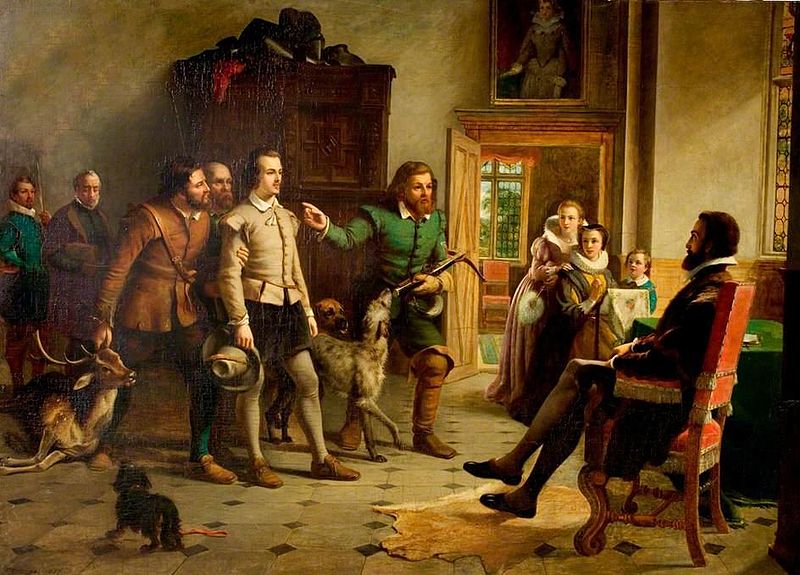Thomas Lucy and Shakespeare’s Lost Ballad September 9, 2017
Author: Beach Combing | in : Modern , trackbackMost Shakespeare scholars believe that Shakespeare’s first plays were written in about 1590, a couple of years before the sonnets: Shakespeare would have been 26. But there must have been earlier attempts, now lost apprenticeships in prose and poetry, where Shakespeare learnt his art. It is just possible that we get a distant echo of Shakespeare’s juvenilia in some eighteenth century ‘footnotes’. Shakespeare’s first biographer, Rowe, wrote the following in 1709, a little less than a century after Shakes’ death.
[Shakespeare] had, by a Misfortune common enough to young Fellows, fallen into ill Company; and amongst them some that made a frequent practice of Deer-stealing, engag’d him with them more than once in robbing a Park that belonged to Sir Thomas Lucy of Cherlecot, near Stratford. For this he was prosecuted by that gentleman, as he thought, somewhat too severely; and in order to revenge that ill Usage, he made a Ballad upon him…
Rowe goes on to say that Shakespeare so irritated Lucy, that the budding writer had to flee Warwickshire and run to London. And there, of course, began another saga… Rowe also claims that Shakespeare managed to get several retrospective insults into his play: particularly in the figure of Justice Shallow. Did Rowe make all this up? Almost certainly not. A similar story was written in 1708 by one Richard Davies in a manuscript that we have no reason for thinking that Rowe saw. Davies does not mention the ballad but he does talk of the battle between Lucy and Shakespeare and how Shakespeare was repeatedly whipped. The story, from there, grew in the telling. Shakespeare pinned a copy of his ballad to Sir Lucy’s gates; Shakespeare killed a deer for a wedding feast; Elizabeth I demanded that Shakespeare be released from prison; Lucy was the true author of Shakespeare’s plays…* etc etc
Shorn of all this happy nonsense we have, then, a genuine tradition: though that is not, of course, the same as saying that any of this really happened. About ninety years after Shakespeare’s death there was the idea that in the 1580s, some hundred and thirty years before, Shakespeare and Lucy had enjoyed a battle of wits. But what about the ballad, which is only referred to by Rowe in the early 1700s? Well, if it ever existed, it was presumably a work swapped around orally, rather than one that was published. Did it tell a story as ‘ballad’ suggests, or was it just a long cacophony of insults to the supercilious and oh-so Protestant Lucy? Supposedly a fragment of the ballad survives. These lines had been collected by one Joshua Barnes in the 1690s, but our oldest surviving version dates to 1727-1730:
Sir Thomas was too covetous
To covet so much deer;
When horns enough upon his head
Most plainly did appear.
Had not his worship one deer left?
What then? He had a wife
Took pains enough to find him horns
Should last him during life.
The implication is that Thomas Lucy was a cuckold, and had horns on his head: i.e. his wife was not faithful (see Merry Wives, passim). Another stanza came down in a similar fashion to the early-mid eighteenth century. It came from a Mr Jones who was born c. 1613 near Stratford and he wrote the poem down in old age, where it eventually (via two pairs of hands) fell into the grasp of the antiquarian Edward Capell
A parliamente member, a justice of peace
At home a poor scare-crowe, at London an asse,
If lowsie is Lucy, as some volke miscalle it,
Then Lucy is lowsie whatever befall it
He thinks himself greate,
Yet an asse in his state
We allowe by his ears but with asses to mate.
If Lucy is lowsie, as some volke miscalle it,
Sing lowsie Lucy, whatever befall it.
Beach would like to think that some of this dribbled out of Shakespeare’s quill. But it has to be said that the hints we have of Thomas Lucy suggest that he might have been unpopular in the area and that this could have resulted in several such rhymes from several such authors. The two versions above, after all, are very different. Other thoughts: drbeachcombing AT yahoo DOT com
*sorry couldn’t resist.



